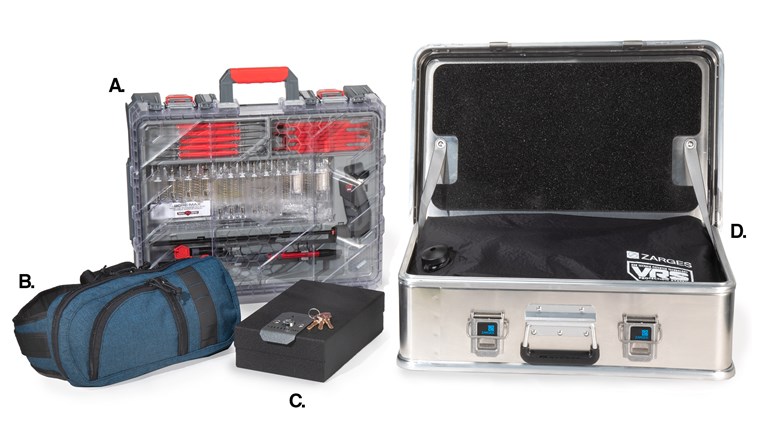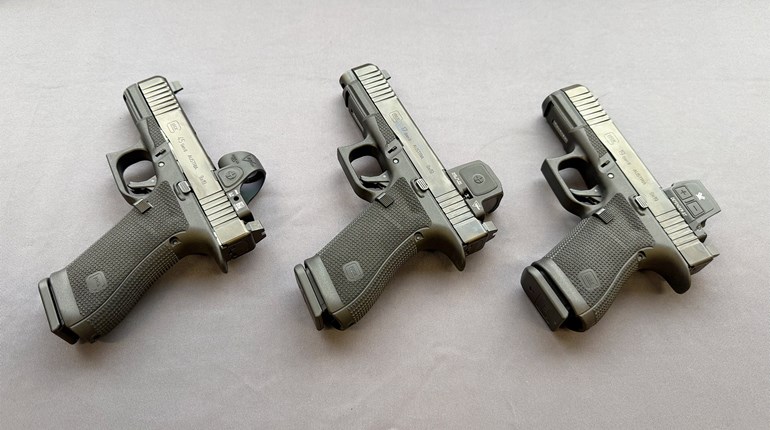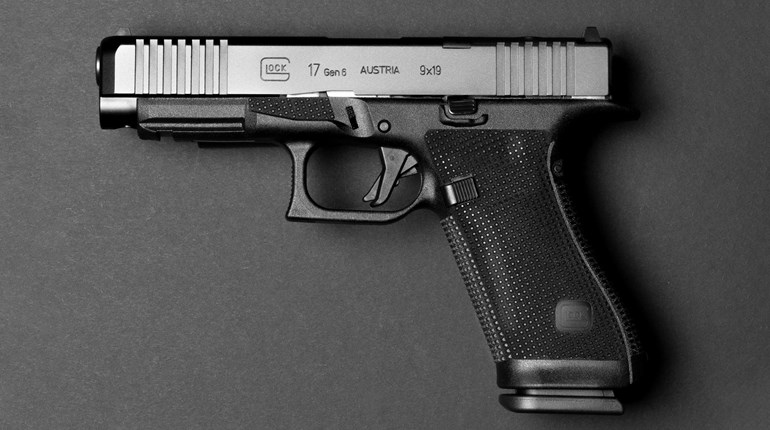
Another “Build” Coming At You
Whether we’ve been spending too much or too little time in the shop of late is open to consideration. Whichever the case, we’ll accept the assertion we’ve had—indeed have—“project on the brain.”
Nor is this our sole affliction. Under the heading of pistol caliber carbines, we’re logging substantial time and rounds down range, all the while wondering if our enthusiasms are remaining at least dignified. Sometimes, we’re having so much fun that decorum must be escaping us.
So here comes another “build,” as First Gear marks the intersection of shop time and shooting with a ground-up PCC project.
Lone Wolf G9 Lower Receiver
No stranger to A1F, Lone Wolf gets a nod here for multiple reasons. The first is affordability—you can have the guys and gals in Priest River, Idaho, dispatch you (well, technically your FFL) a completed G9 lower for less than $400.

The second attribute is a “vouch-for” kind of thing: We’ve banged on these quite a bit in two calibers, and our report is very good. You can certainly spend more to get more in several senses (and that first “more” is usually a lot more), but as a place to start, these are hard to improve on—and for our third reason as well.
We have numerous shooting pals that are taking the ground-up approach (which is instructive too, and can be even cheaper), but nearly all have eventually run afoul of performance in the same place—trigger components. Many factors contribute to this, but our point is simple—correct, dependable geometry and MILSPEC steel parts will arrive inside your G9 without fuss.
Both our samples have been worth improving with the likes of JP trigger springs (here or here). While it’s crucial to follow the instructions and know how to check a reconfigured trigger for proper action and safety engagement (beginning at ~1:00), our results have been well more than satisfactory.
Last, we’re caching/cashing in on a decade-long habit of buying Glock mags when we can find them on sale. Always reasonable compared to most others (and especially to those of their European-spawned brethren), they are tough buggers, and well adapted to carbine use as a 500-plus round, error-free transit of USPSA Optics Nationals ought to suggest.
That’s our jumping-off point—hang on!
Visit Lone Wolf at www.lonewolfdist.com/ MSRP on the G9 is $385, and must ship to an FFL.
Brigand Arms Handguard
Another concession: We’re ahead of ourselves with the Brigand Arms “Blade” handguard. The one you see pictured is of course on a stamped, SBR-ed upper, and is therefore shorter than most people are going to want or need (unless you’re building a “short-barreled rifle” too). In such case, make sure you get the right paperwork filled out and receive it back from the ATF.
But based on limited runs with that carbine, our description takes a paltry seven letters: “Holy Cow!” will do it.

The folks at Brigand have several versions of their super lightweight, braided carbon fiber ‘guards, and we can tell you there’s a lot to like. Under four ounces, for instance, on the 7-inch Blade in our photo. But even their longest/largest is only about eight ounces, including affixture hardware. All three models are free-floating, and all three go on with entirely conventional tools (another big plus in our opinion).
There are two other things we can also say for sure at this point. First, we can find no hint of weakness in the finished assembly, despite what our über-witty creative director describes as the “macramé” handguard (we’re only sore ‘cause he beat us to it, we admit).
Second, and perhaps obvious on close inspection, is that this may be the most uniformly and ubiquitously “grippy” handguard out there, and especially when you consider not one darn thing needs to be added, placed or fitted to it. Straight out of the box, it does very nicely. And if there is a way to roll it in actual use that feels insecure, we’ve yet to find it.
We admit it’s early, but expect to hear more, and soon. Note, too, how we didn’t sully ourselves with a single subjective, shabby, shallow comment about how utterly bad-ass it looks, either.
Oops.
Visit Brigand Arms at https://brigandarms.com/ MSRPs on Brigand braided carbon-fiber handguards range from $259-414.
SJC PCC Comp
The family of SJC Titan/Lund comps aren’t “news,” per se, especially to folks who’ve been running “black rifles” for a spell. The Titan is classic as a bounce-killer extraordinaire, letting the muzzle and sights stay remarkably quiet with all the attendant benefits.
Granted, they were loud. Really loud. Even get-that-thing-outta-my-zip-code loud.

The same problems don’t quite come up in pistol caliber carbine land. In terms of volume, you don’t have the big volume of gas that redirects as noise. In terms of counteracting muzzle movement, you don’t have the big volume of gas that … uh-oh … is available to counteract muzzle movement. See the problem? There’s even a school of thought that insists this means there’s no point in comps on 9 mm PCCs.
Well don’t you believe it: SJC has whipped this thoroughly too, we think. We’ve only tried it with two kinds of factory ammo and one home-grown load (and that hardly optimized for with-comp use via an appropriate, high gas-volume powder).
As with the Brigand Arms, we’re jumping the, er, gun a bit, but the preliminaries are just that good. Keep up with our build to see if we can get this up to the standard of their other compensators, and rest assured we’ll have load data to help with your considerations.
If there was a last nail to drive in terms of establishing SJC’s authority here, we think we’ve found it on their website—three thread pitches and two materials (steel and titanium).
Visit SJC at stores.sjcguns.com MSRPs on PCC comps are $90 for steel, and $160 for titanium.
That ought to satisfy just about any carbine build plan you—or we—have got.
Frank Winn has been studying arms and their relationship to tyranny, meaningful liberty and personal security all his adult life. He has been a firearms safety/shooting instructor for more than 20 years, and earned state, regional and national titles in several competitive disciplines.


































